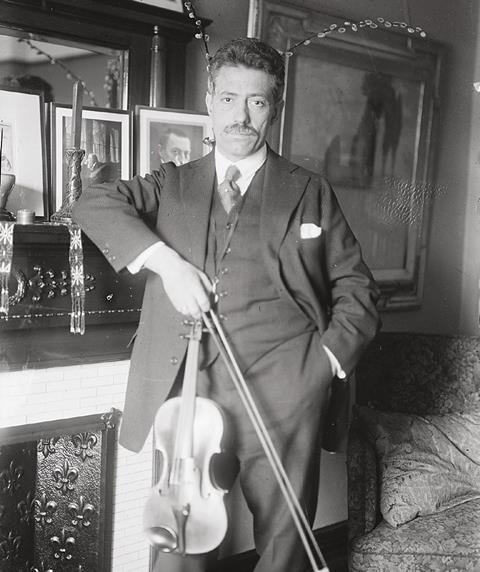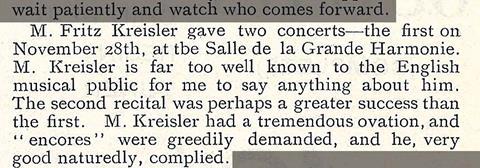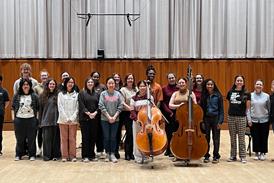Today we’re shining a light on Fritz Kriesler, who was born on this day in 1875. As a child, Thomas Zehetmair was entranced by the stories Kreisler told in his playing. From October 2013

Discover more Featured Stories like this in The Strad Playing Hub
This article appeared in the October 2013 issue of The Strad
What was your first encounter with Fritz Kreisler?
When I was a young teenager, at home we had Kreisler’s recording of the Beethoven Concerto, conducted by Leo Blech. He had such a wonderful sound. What struck me immediately was that there was so much content in it and that he was telling a story. I realised later that his quality of sound was unique, and also that if you listen to a slow phrase you always have the feeling of a line from the beginning to the end. In the slow movement of a Beethoven sonata, for example, there is this amazing sense of the whole line, and not just notes. But his playing is still very colourful and personal, and he has an incredible elegance.
What effect has his playing had on your own?
I’m sure that as a child I was affected by his qualities. You are young and you want to learn from the great violinists – that’s clear. But when I first listened to Kreisler, I was not yet conscious of what made him great. Everyone finds their own way, but it was always inspiring to listen to him, the sonority of his sound, the different colours, and his individuality as a player. One of the reasons he refused to teach all his life was that he thought a student has to develop their own style on their own. There were other reasons: he thought he would be too kind to give a student nasty remarks in order to improve them. But of course all violinists learnt from him, including me.
What influence did he have on the violinists that followed him?
The great violinists of the next generation owed him much. They all spoke very highly of him – players such as Oistrakh and Milstein wouldn’t have played like they did if it were not for Kreisler. A great personality creates style and influences many people. Kreisler was once asked about the young generation and he said he liked the fact that Oistrakh had the courage to play slowly in New York, and to give the notes enough content in order to avoid having to play fast. Kreisler felt that everyone wanted to play very fast in New York.
How do his compositions relate to his playing?
Somehow you can hear that he is a composer when he plays – he’s inside the piece. One great recording is of him performing his own string quartet, with Thomas Petre, William Primrose and Lauri Kennedy. The piece is full of spirit and shows his profound knowledge of harmony and composition. He had studied theory with Bruckner in his childhood and you can hear it in the quartet. Like many great violinists, he loved playing chamber music. He sometimes got together with Ysaÿe, Thibaud and Casals, and they would play chamber music all night. In his writings Kreisler mentions that the three violinists all wanted to play second violin, so they could enjoy the piece from the middle.
‘Things change but Kreisler’s playing is wonderfully convincing, and he was an absolutely timeless musician’
What are your other favourite Kreisler recordings?
I enjoy the recording of the Paganini D major Concerto in the version he rearranged. It’s ‘Paganini in Vienna’. He rewrote the tutti and changed the harmony completely. There are all these difficult scales in the violin part and meanwhile there is a beautiful line in one of the orchestral parts, so the virtuoso passages are an accompaniment to the main melody. If you know the original well it’s so surprising and it makes you smile.
He was already over 60 but he plays amazingly and many places are magical. He was also a very good pianist and recorded the Dvorˇák Humoresque in his version for violin and piano, as well as for solo piano: you can hear that he managed to achieve his unique sound on the piano as well as on the violin.
Are there any aspects of his playing that you don’t like so much?
The fact I don’t like about him is that he never recorded the Elgar Concerto. It was written for him and he was the first to perform it, so it would be amazing to hear how he performed it.
How else has he inspired you as a player?
Everybody mentions that he was a very generous and modest personality. He was once playing the Brahms Concerto in Philadelphia with Eugene Ormandy.
The famous oboist Marcel Tabuteau played the opening solo and Kreisler was overwhelmed by it. He turned away from the audience and played it exactly the same. Afterwards he said, ‘Brahms has spoken to us.’
Things change but Kreisler’s playing is wonderfully convincing, and he was an absolutely timeless musician, one of the greatest talents.

INTERVIEW BY ARIANE TODES
Read: From the Archive: 1733 Guarneri ‘del Gesù’ violin, ‘ex Kreisler’
Watch: Violinist Christian Li performs Kreisler’s Tambourin Chinois
Watch: Great string players of the past: Kreisler
Read more Featured Stories like this in The Strad Playing Hub
The number one source for playing and teaching books, guides, CDs, calendars and back issues of the magazine.
In The Best of Technique you’ll discover the top playing tips of the world’s leading string players and teachers. It’s packed full of exercises for students, plus examples from the standard repertoire to show you how to integrate the technique into your playing.
The Strad’s Masterclass series brings together the finest string players with some of the greatest string works ever written. Always one of our most popular sections, Masterclass has been an invaluable aid to aspiring soloists, chamber musicians and string teachers since the 1990s.
American collector David L. Fulton amassed one of the 20th century’s finest collections of stringed instruments. This year’s calendar pays tribute to some of these priceless treasures, including Yehudi Menuhin’s celebrated ‘Lord Wilton’ Guarneri, the Carlo Bergonzi once played by Fritz Kreisler, and four instruments by Antonio Stradivari.













































No comments yet